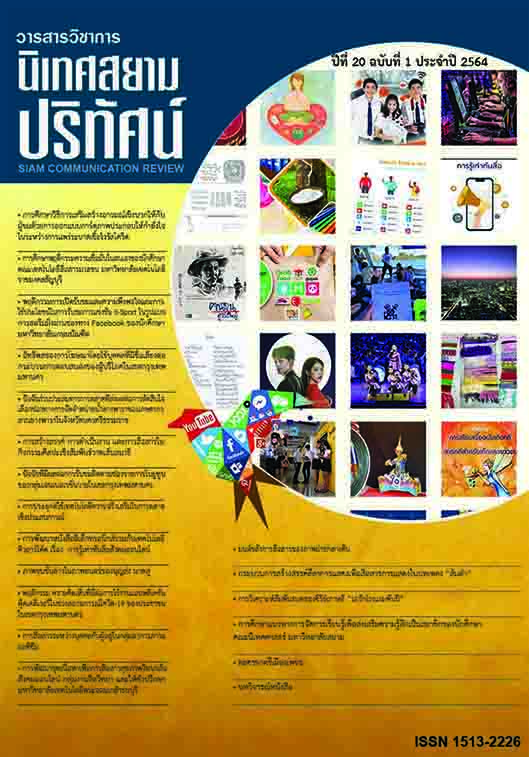Study of Learning Management to Promote Students Engagement to the Faculty of Communication Arts, Siam University
Main Article Content
Abstract
The student’s engagement means that the student’s attributes show their intention, interest, and effort towards learning, which leads to lifelong learning. Therefore, teaching and learning to promote student’s engagement is important. The guideline of learning management for enhancing a sense of engagement of students requires the participation of learning both inside and outside of the classroom. The educational institutions should provide learning in order to enhance a sense of engagement including the participation in emotional, behavioral, physical, social and cultural learning.
The researcher appreciates the feeling of being a member of the student with an educational institution. According to that, the researcher studies the approach of the learning management to promote a student’s engagement from the Faculty Communication Arts, Siam University. Demanding that, the learners will have a lifelong learning skill. Finding factors that cause gaps in the feeling of membership and finding a solution of filling in this gaps by analyzing the interviews from lecturers and students in order to find the way of making students feel that they are a member of Faculty Communication Arts Siam University by proposing a faculty-level learning management to have a policy on the management of learning spaces and equipment. Also, organize the activities that focus on student participation. At the curriculum level, courses must be integrated both professional and non-professional groups and external organizations. And the level of courses that need to be organized should emphasize the participation of students by using a non-formal education approach to manage feelings of membership.
Article Details
References
ขวัญชัย ขัวนา และธารทิพย์ ขัวนา. (2562). การจัดการเรียนการสอนเพื่อส่งเสริมทักษะการเรียนรู้ในศตวรรษที่ 21 (รายงานผลการวิจัย). สกลนคร: มหาวิทยาลัยราชภัฏสกลนคร.
จุฑาจิตร ประดิษฐเจริญ และบังอร โสฬส. (2560). บทบาทของอัตลักษณ์องค์การ และความมุ่งมั่นทุ่มเทในการทำงานที่มีต่อพฤติกรรมการเป็นสมาชิกที่ดีขององค์การ (รายงานผลการวิจัย). กรุงเทพฯ: มหาวิทยาลัยศิลปากร.
นพมาส ว่องวิทยสกุล. (2557). การพัฒนาโปรแกรมเพื่อเสริมสร้างความยึดมั่นผูกพันกับการเรียนและผลสัมฤทธิ์ทางการเรียนวิชาภาษาไทยของนักเรียนชั้นประถมศึกษา: การทดลองอนุกรมเวลา. ปริญญานิพนธ์ปริญญาดุษฎีบัณฑิต, จุฬาลงกรณ์มหาวิทยาลัย.
ภูริวรรษ คำอ้ายกาวิน. (2557). การนำเสนอกลยุทธ์การจัดการศึกษาเพื่อพัฒนาทักษะชีวิตที่จำเป็นสำหรับเด็กด้อยโอกาสในการเสริมสร้างการยอมรับเป็นสมาชิกของสังคม. ปริญญานิพนธ์ปริญญาดุษฎีบัณฑิต, จุฬาลงกรณ์มหาวิทยาลัย.
มาลินี ศรีไมตรี มาลินี ศรีไมตรี และปิยกนิฏฐ์ โชติวนิช. (2559). พฤติกรรมที่ดีขององค์การสู่การเป็นสมาชิกที่ดีขององค์กร (รายงานผลการวิจัย). กรุงเทพฯ: ปัญญาภิวัฒน์.
วัชรินทร์ อินทร์นุ่ม. (2561). การเสริมสร้างความยึดมั่นผูกพันของนักศึกษาระดับปริญญาบัณฑิต โดยใช้โปรแกรมการสนับสนุนอิสระด้วยตนเอง. ปริญญานิพนธ์ปริญญาดุษฎีบัณฑิต, จุฬาลงกรณ์มหาวิทยาลัย.
อาคม ศิริพิน และศยามล เอกะกุลานันต์. (2560). ปัจจัยที่มีอิทธิพลต่อพฤติกรรมการเป็นสมาชิกที่ดีขององค์การของบุคลากรสังกัดเวชศาสตร์การบิน กองทัพอากาศ (รายงานผลการวิจัย). กรุงเทพฯ: มหาวิทยาลัยอีสเทิร์นเอเชีย.
ธีรวันท์ โอภาสบุตร. (ม.ป.ป.). วัฒนธรรมองค์กร. ม.ป.ท. (เอกสารไม่ตีพิมพ์)
ระบบออนไลน์
KM-Li Learning Institute, KMUTT, (2559). แนวคิดและงานวิจัยด้าน student engagement. Retrieved from http://celt.li.kmutt.ac.th/studentengagement
Great Schools Partnership. (2016). The Glossary of Education Reform for Journalists, Parents, and Community Members: Student Engagement. Retrieved from https://www.edglossary.org/student-engagement/


